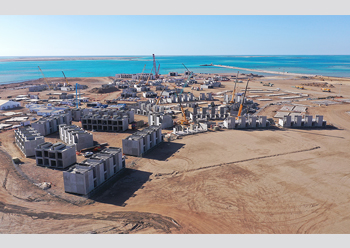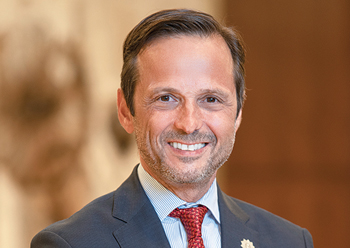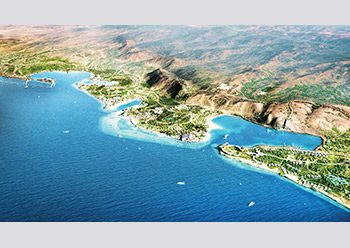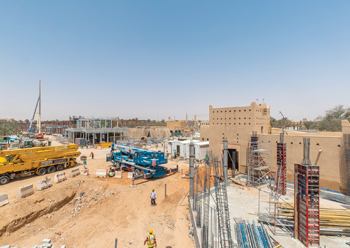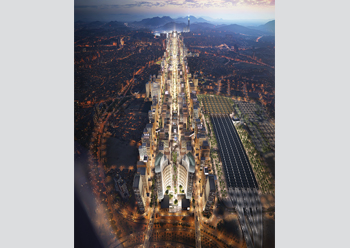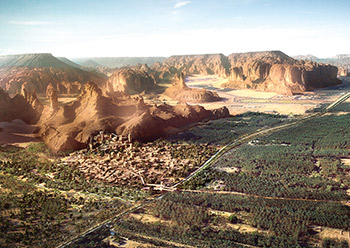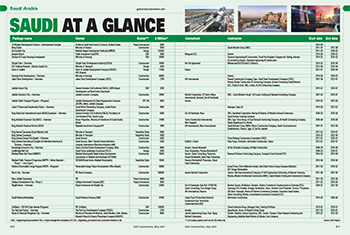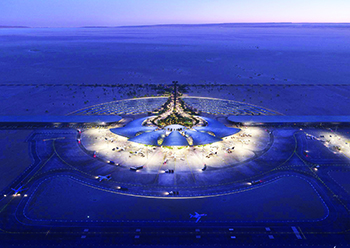
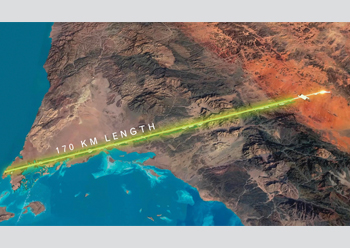 The line ... a 170-km belt extending from the Red Sea to the mountains of the northwest.
The line ... a 170-km belt extending from the Red Sea to the mountains of the northwest.
Ambitions run high for the $500-billion Neom development, which not only aims to become the world’s first digitally sustainable cognitive city – where world-class technology is fuelled with data and intelligence to interact seamlessly with its population – but also aspires to transform the way cities are built in the future.
The futuristic city coming up in the northwest of Saudi Arabia created quite a stir early this year with the launch of The Line, which is described as a revolution in urban living.
Linking the coast of the Red Sea with the mountains and upper valleys of the northwest of Saudi Arabia, The Line is one of the most complex and challenging infrastructure projects in the world and forms part of extensive development work already under way at Neom. Initial work on The Line is expected to start this year.
Described as a 170-km belt of hyper-connected future communities, without cars and roads and built around nature, the proposed linear development aims to address some of the most pressing challenges facing humanity today such as the legacy infrastructure that today’s cities are currently bound by, pollution, traffic, and human congestion, according to Neom. In this city of the future, walkability is key, with roads and streets replaced by piazzas and walkable boulevards filled with parks and green spaces.
.jpg) |
|
|
Neom – located north of the Red Sea, east of Egypt across the Strait of Tiran and south of Israel and Jordan – will cover a total area of 26,500 sq km and will extend 460 km along the coast of the Red Sea. It is part of the world-class, diversified portfolio of Saudi Arabia’s Public Investment Fund, one of the largest sovereign wealth funds in the world.
Being built from the ground up as a living laboratory, Neom will include hyper-connected towns and cities, ports and enterprise zones, research centres, sports and entertainment centres, entertainment venues and tourist destinations. It will produce cost-effective clean energy by establishing onshore windfarms and creating the planet’s first at-scale green hydrogen facility.
Unveiling The Line project in January, His Royal Highness Mohammed bin Salman, Crown Prince and Chairman of the Neom Company Board of Directors, said: “I present to you The Line. A city of a million residents with a length of 170 km that preserves 95 per cent of nature within Neom, with zero cars, zero streets and zero carbon emissions.
“The Line is the first time in 150 years that a major urban development has been designed around people, not roads. Walkability will define life on The Line – all essential daily services, such as schools, medical clinics, leisure facilities, as well as green spaces, will be within a five-minute walk.
“Ultra-high-speed transit and autonomous mobility solutions will make travel easier and give residents the opportunity to reclaim time to spend on health and wellbeing. It is expected no journey will be longer than 20 minutes.”
.jpg) |
|
|
The Line’s communities will be cognitive, powered by artificial intelligence (AI), continuously learning predictive ways to make life easier, creating time for both residents and businesses. An estimated 90 per cent of available data will be harnessed to enhance infrastructure capabilities far beyond the one per cent typically utilised in existing smart cities.
Redefining sustainability, The Line will comprise carbon-positive urban developments powered by 100 per cent clean energy, providing pollution-free, healthier and more sustainable environments for residents. Mixed-use communities will be built around nature, instead of over it.
The Line will be supported by an invisible layer of infrastructure that is embedded with sustainable smart technology containing essential utilities and transportation services, generating care-free communities and public realms. It aims to connect four distinctive ecologies: Coastal; Coastal Desert; Mountain and Upper Valley.
Neom is piloting new technologies to build The Line as a model system for other future cognitive cities around the world.
The technologies deployed in Neom will be designed, developed, and tested with scale, security, and real-time compute and predictive power in mind.
According to Neom’s CEO Nadhmi Al-Nasr, the Line is “the uniqueness of Neom and a revolutionary idea of urban planning for the future and will go beyond Neom.
“This is a revolution in urban planning and we believe that it is going to set the stage for the new model of urban planning for many decades to come.”
While the project was conceptualised back in 2017, the past three years have gone into masterplanning the majority of the regions and masterplan completion, “which basically means we will start implementing the masterplans this year,” he said.
A number of key appointments have been made on the project over the past year.
Among the most recent, Burj Al Shifa Medical Complex is setting up a new health and wellness centre within the mammoth development. Burj Al Shifa Medical Complex is being managed by International SOS-Al Rushaid, a major provider of complete and integrated medical services solutions for onshore and offshore clients.
The state-of-the-art Neom Community Advanced Health Center, will provide health and wellbeing services to the Neom community and is scheduled to open during the first half of this year. Following its opening, Burj Al Shifa Medical Complex will operate and maintain the centre for three years with a potential extension of 18 months.
In September last year, Aecom, one of the world’s premier infrastructure consulting firms, was tasked to design the transport and utilities backbone infrastructure for the futuristic city.
In addition to design services, Aecom’s scope will also include environmental and geotechnical support. The company was earlier appointed to provide project management consultancy services for Phase One of the construction in Neom.
According to Bill Price, the Programme Director at Aecom, the company’s global team will be using the latest innovations to deliver a 100 per cent digital design.
“The delivery team will adopt a data-led process, providing information-rich 3D models and geospatial data. The digital delivery processes will also enable collaboration across global teams and provide them with the tools to efficiently design for construction,” he added.
In August, Bechtel, a global leader in engineering, procurement and construction, was awarded a major contract for executive project management work on the development of the primary, base infrastructure for Neom. Bechtel will oversee and create resource-efficient utilities and a highly advanced transport system to connect its cognitive cities.
The scope of work includes simultaneous construction in multiple locations requiring extraordinary engineering solutions in challenging terrain, according to Neom.
Among other appointments, Saudi telecom giant stc has been roped in to establish a 5G network infrastructure that will accelerate Neom’s digital ambitions. In addition to the one-year contract to develop the network, stc’s scope of works also includes the development of an innovation centre in Neom to explore new 5G opportunities, it added.
stc will build a wireless 5G network enabling present and future 5G applications across Neom. With a speed and capacity 10 times higher than standard 4G networks, 5G in Neom will enable numerous segments such as Internet of Things (IoT), data analytics, virtual reality, augmented reality, smart homes, and autonomous vehicles. It will also provide the public safety network for Neom security services.
Neom also signed a $5-billion partnership with US-based Air Products and Saudi Arabia’s Acwa Power to develop the world’s largest green hydrogen and green ammonia plant to be operational in 2025.
The world-scale green hydrogen-based ammonia production facility powered by renewable energy will be equally owned by the three partners, and will produce green ammonia for export to global markets.
It is based on proven, world-class technology and will include the innovative integration of over four gigawatts of renewable power from solar, wind and storage; production of 650 tons per day of hydrogen by electrolysis using thyssenkrupp technology; production of nitrogen by air separation using Air Products technology; and production of 1.2 million tons per year of green ammonia using Haldor Topsoe technology. The project is scheduled to be onstream in 2025.
Air Products will be the exclusive off-taker of the green ammonia and intends to transport it around the world to be dissociated to produce green hydrogen for the transportation market.
Powered by cost-effective, clean energy, Neom will power energy-intensive industries that can be located at the heart of communities. The green energy produced will eliminate major causes of air pollution and improve both health and livability.
Peter Terium, Neom’s Head of Energy, Water and Food, said: “Neom will set up a decentralised, cascading grid of microgrids, with architecturally integrated renewables and storage, to fully meet residential power demand. Furthermore, bulk energy supply will power Neom industries and businesses, optimised for record low cost, minimal emissions and maximum reliability.”

















.jpg)













 (1).jpg)














































